Quillan Thurmond has spent two months writing a paper on the 1383–85 Portuguese interregnum.
Not because a teacher asked, but because the sophomore wanted to.
“It gets really complex behind the scenes,” Thurmond said. “It may seem like something no one’s ever heard of, but it is a very relevant turning point in the world.”
But he wasn’t born a historian.
Walking through Rice University, a then 7-year-old Thurmond’s conversations with his father about World War II changed him forever.
These conversations made him love history.
“My dad is very interested in history and having him around just always made me aware of it,” Thurmond said. “He always made an effort to make sure I knew about history because he felt it was very important. I was exposed to movies, books and games surrounding the topic that I found very interesting.”
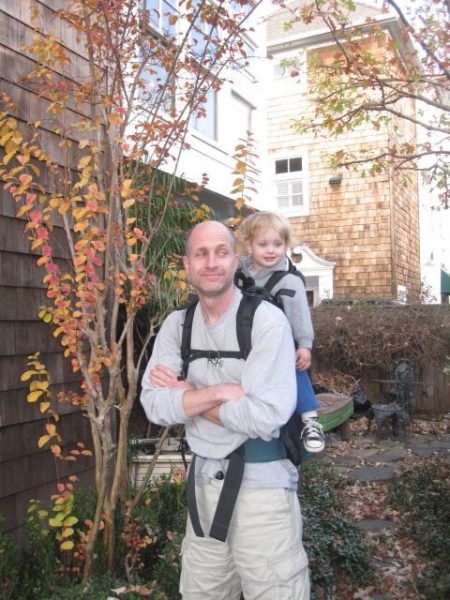
Historical media such as “All Quiet on the Western Front” and “Sid Meier’s Civilization V” allowed this passion to expand southward from his brain and into his heart. Every day, Thurmond plays three hours of “map games” and reads Britannica and Wikipedia pages for 45 minutes, all while having documentaries that chronicle histories’ greatest moments play in the background.
“The first time I played ‘Civilization V’ I was so compelled to keep on playing it,” Thurmond said. “I think it was just the progression [and] watching everything develop was so interesting to me. This all really happened. It took way longer, obviously, but this is how the world works. It’ll never change.”
The fifth installation in the “Sid Meier’s Civilization” franchise, “Civilization V” is a turn-based strategy game where players control and lead a civilization from the ancient era into the modern day with the goal of winning through one of five victory conditions.
Despite this interest in history, Thurmond struggled to learn the subject – he lacked an “outlet” to learn and was “confused” on how to approach it. In seventh grade, his Texas History teacher, Mr. Gómez, changed this.
“Mr. Gómez made history interesting,” Thurmond said. “I always thought it was interesting, but I didn’t understand how I would go about learning it. He presented information in such a way that made me need to know more. I kept finding ways to learn about history; I wanted to know things like he did.”
Thurmond’s passion for history only continued to grow, transforming his approach to learning the topic. As his perspective has evolved, he has gone far past the point of seeing history as just dates and events.
“This idea that history is all about knowing this day, this year – it’s not all about the dates,” Thurmond said. “It’s about everything that changed during that time, everything that caused that. Yes, it happened on a different day, but that’s not as relevant as what was actually going on.”
The inspiration that Thurmond drew from Mr. Gómez continued with his HADV World Geography teacher, Ms. Kulheman, and his AP World History teacher, Mr. Cothran. Yet, Thurmond believes that the way College Board presents the content in the course makes students less interested in the subject.
“I hear a lot of my friends [say], ‘I don’t want to go to history,’” Thurmond said. “It really frustrates me with College Board. This subject has so much untapped potential for kids that would love to learn about it, and how impactful it would be if people knew it. It’s just the presentation of the curriculum that really falls short.”
College Board’s website states that AP World History as a course “isn’t just about memorizing dates and battles – it’s about exploring civilizations and cultures from a global perspective to better understand the complex relationships that exist today.” However, Thurmond’s grievances ultimately begin with the course’s free response questions (FRQs) and the formats they follow.
“In AP World, we do LEQs, DBQs and SAQs,” Thurmond said. “One thing that’s really emphasized is these formulas we should follow to make sure our information is presented well for the grader. I think it’s important to get good grades, but it doesn’t [leave] a lot of room for your own thought process. If kids spent more time really thinking about it, people would start to understand it more, remember it better and be more interested in it.”
Cothran, Thurmond’s teacher for AP World History, hopes that similarly to Thurmond, other students could “learn to view historical topics as extensions of past events.” Cothran believes that “you can’t fully understand history without a broad understanding of the past or putting prior events into context.”
“[Thurmond’s] passion for history is very evident in his questioning,” Cothran said. “He asks deep thoughtful questions which demonstrate a full contextualization and periodization of the topic.”
Thurmond’s lifelong interest has not only been for entertainment; it has been a tool that has shaped him, ultimately allowing him to understand people better.
“It definitely helps with noticing some of the smaller details in life,” Thurmond said. “When studying history, if you accidentally gloss over something, it can leave you confused. So when it comes to your daily life, you notice the small details of how people act and understand how they behave. You can know when to ask someone for help, or ask them if they need help.”
Sophomore and classmate Miley Nguyen is one of Thurmond’s closest friends and views him “like a brother.” Nguyen describes Thurmond and his interest in history as “energetic” and “passionate,” saying that his own interest has influenced her.
“He’s inspired me to start listening to the news more closely,” Nguyen said. “Knowing the news from other countries helps to know about other people’s perspectives. That’s really all history is, knowing about people’s perspective.”
Since he took Mr. Gómez’s class in seventh grade, Thurmond has also been enrolled in German language classes in hopes to one day study at Humboldt University in Berlin. Humboldt, which has educated the likes of Bismarck, Marx, Engels, Schrodinger and Einstein, is one of the “best universities” for its social studies and humanities science programs.
But prospective historians like Thurmond face an unfortunate issue: pay.
“I find it difficult to see myself working professionally as a historian,” Thurmond said. “It’s very vague and difficult – not for the content, but the ‘making money’ part of it. I would love to do it if it was more stable. Being a professor or teacher could be awesome, but as everyone kind of knows, pay for teachers isn’t great. I know the [deciding] aspect of a job isn’t only pay, you should also love your job, but I think those are the two possibilities.”
Regardless of whether he continues to pursue history professionally, Thurmond still considers himself a historian, and even with the challenges it brings, he is proud to do so.
“It’s something I’m passionate about,” Thurmond said. “Sometimes I wish I had learned something more useful or more interesting to other people. It’s hard to find people who care about history the same way I do. I think that, but [then] I’m like, ‘You know what? I’m doing my own thing. It’s something I care about, and you can’t change that.’”
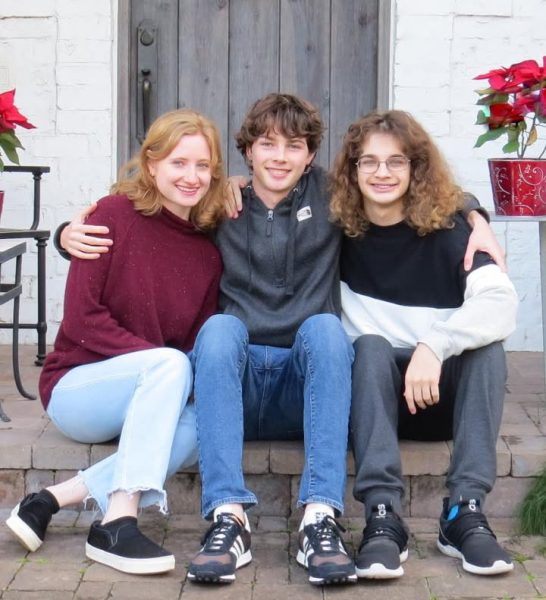



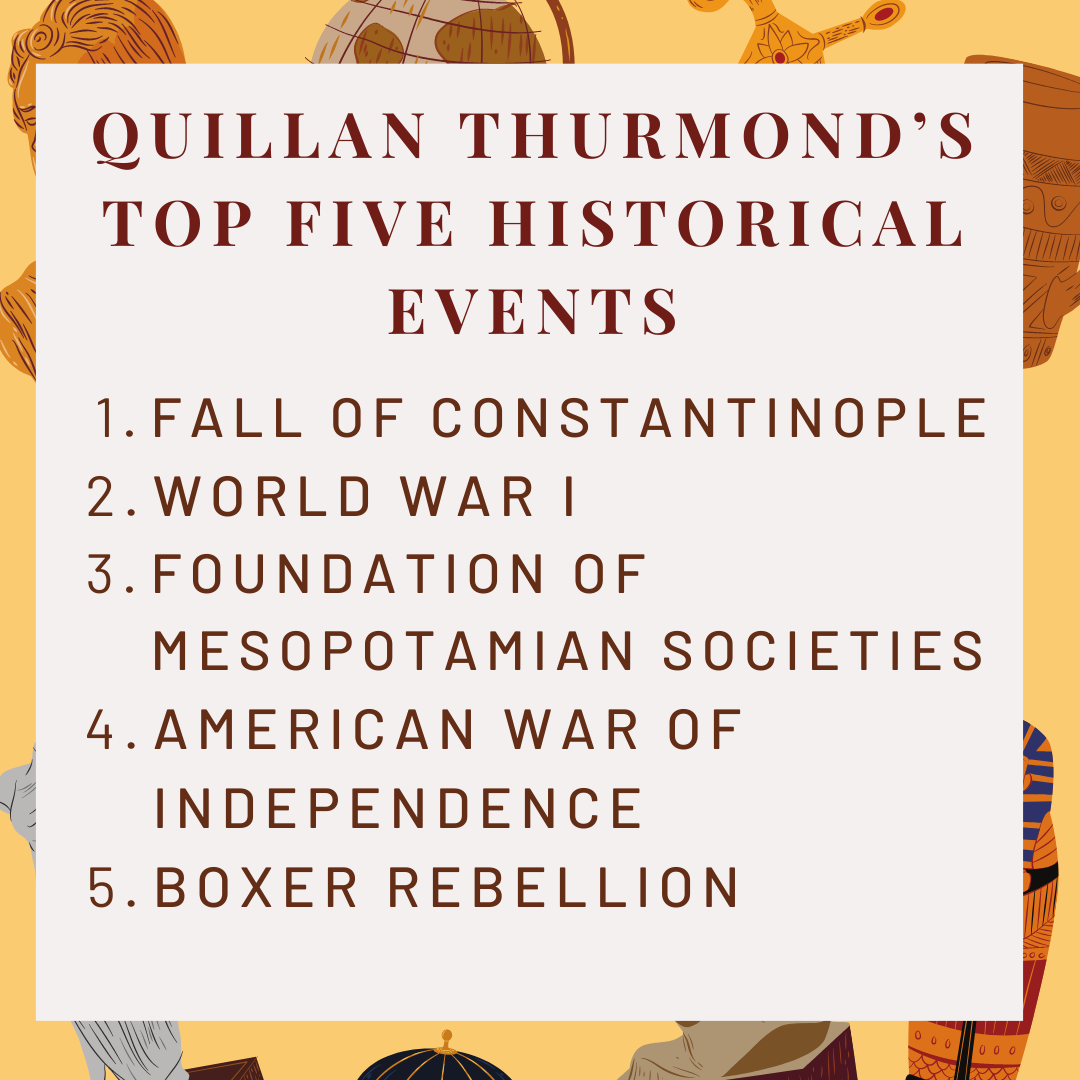

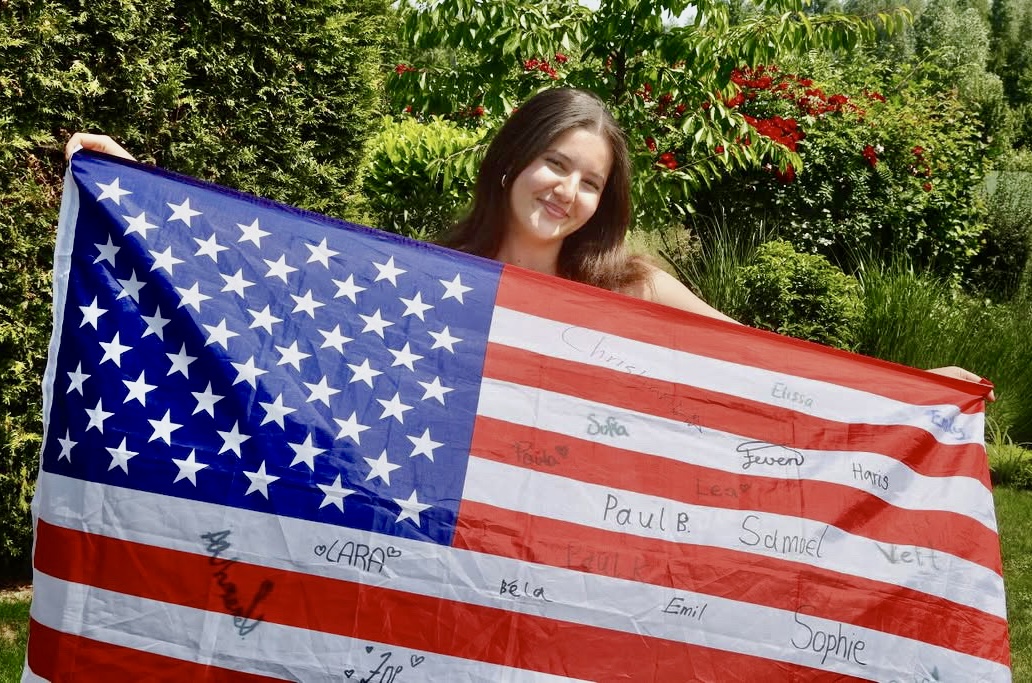

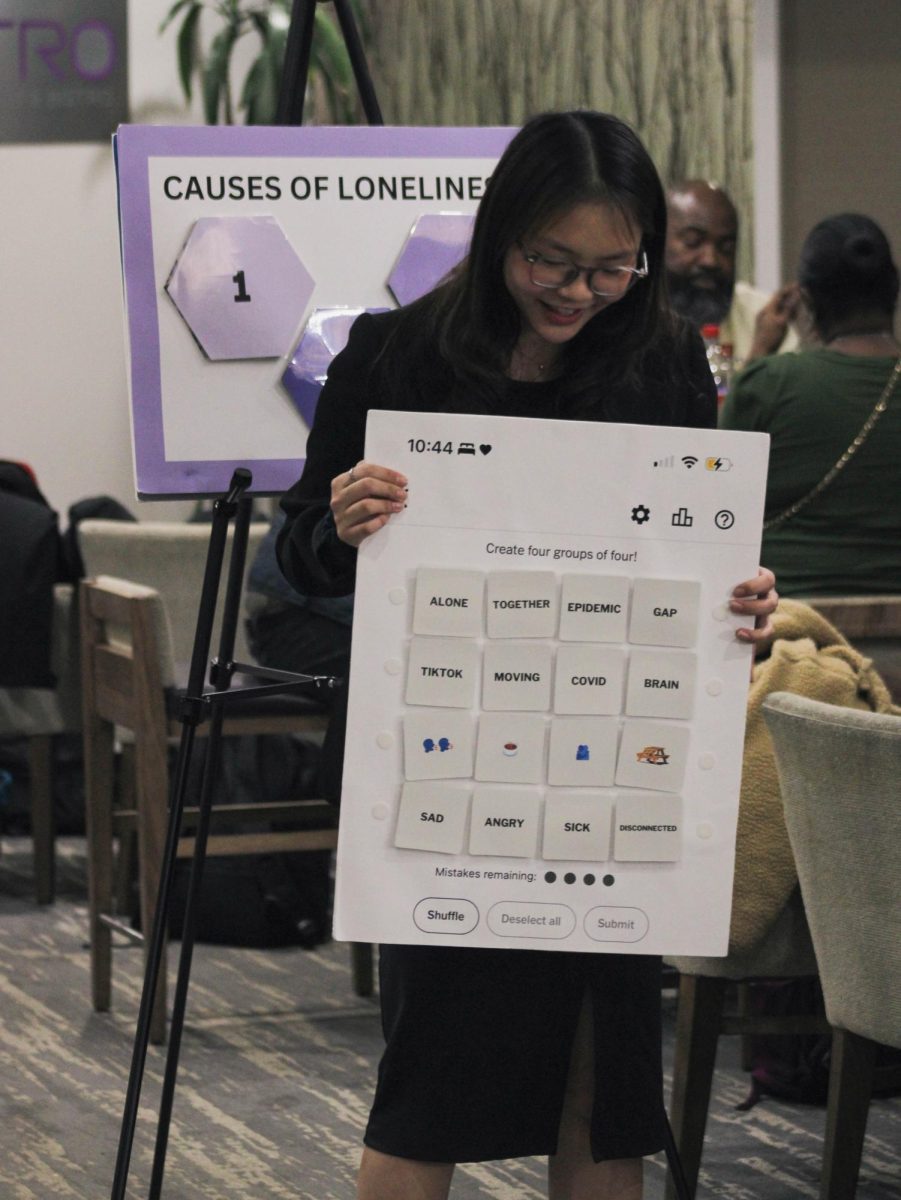
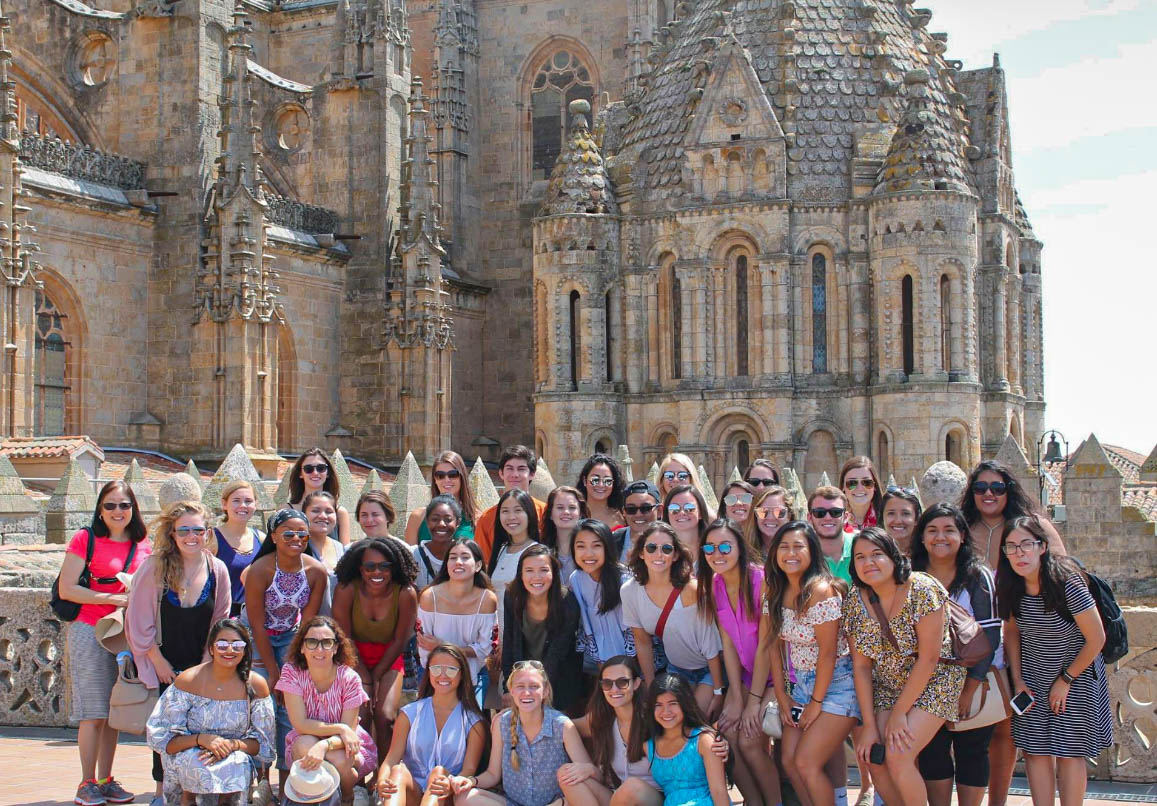

Elaine Turner • Feb 9, 2025 at 10:40 am
As Quillan’s aunt, I can honestly say he is an inspiration. His wealth of knowledge is astounding and everytime I’m around him I walk away learning something new. We need more curiosity and creativity in this world! Thank you Q for being you!